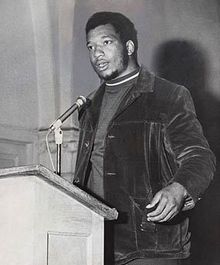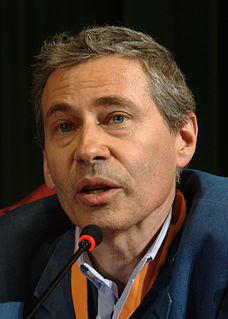A Quote by Emma Goldman
With the conception that the Revolution was only a means of securing political power, it was inevitable that all revolutionary values should be subordinated to the needs of the Socialist State; indeed, exploited to further the security of the newly acquired governmental power.
Related Quotes
Taken as a whole, the Chinese revolutionary movement led by the Communist Party embraces the two stages, i.e., the democratic and the socialist revolutions, which are two essentially different revolutionary processes, and the second process can be carried through only after the first has been completed. The democratic revolution is the necessary preparation for the socialist revolution, and the socialist revolution is the inevitable sequel to the democratic revolution. The ultimate aim for which all communists strive is to bring about a socialist and communist society.
I think art is the only political power, the only revolutionary power, the only evolutionary power, the only power to free humankind form all repression. I say not that art has already realized this, on the contrary, and because it has not, it has to be developed as a weapon, at first there are radical levels, then you can speak about special details.
The anarchists put the thing upside down. They declare that the proletarian revolution must begin by doing away with the political organization of the state. But to destroy it at such a moment would be to destroy the only organism by means of which the victorious proletariat can assert its newly-conquered power, hold down its capitalist adversaries, and carry out that economic revolution of society without which the whole victory must end in a new defeat and a mass slaughter of the workers similar to those after the Paris commune.
A social group can, indeed must, already exercise 'leadership' before winning governmental power (this is indeed one of the principal conditions for the winning of such power); it subsequently becomes dominant when it exercises power, but even if it holds it firmly in its grasp, it must continue to 'lead' as well.
We ain't gonna fight no reactionary pigs who run up and down the street being reactionary; we're gonna organize and dedicate ourselves to revolutionary political power and teach ourselves the specific needs of resisting the power structure, arm ourselves, and we're gonna fight reactionary pigs with INTERNATIONAL PROLETARIAN REVOLUTION. That's what it has to be. The people have to have the power: it belongs to the people.
From the viewpoint of political power, culture is absolutely vital. So vital, indeed, that power cannot operate without it. It is culture, in the sense of the everyday habits and beliefs of a people, which beds power down, makes it appear natural and inevitable, turns it into spontaneous reflex and response.
We ain't gonna fight no reactionary pigs who run up and down the street being reactionary; we're gonna organize and dedicate ourselves to revolutionary political power and teach ourselves the specific needs of resisting the power structure, arm ourselves, and we're gonna fight reactionary pigs with international proletarian revolution.
When you think of power, you think the state has power. When you look at it in terms of revolution, in terms of the state, you think of it in terms of Russia, the Soviet Union, and how those who struggled for power actually became victims of the state, prisoners of the state, and how that led to the dissolution of the Soviet Union. We have to think of revolution much more in terms of transitions from one epoch to another. Talk about Paleolithic and Neolithic.
When you think of power, you think the state has power. When you look at it in terms of revolution, in terms of the state, you think of it in terms of Russia, the Soviet Union, and how those who struggled for power actually became victims of the state, prisoners of the state, and how that led to the dissolution of the Soviet Union. We have to think of revolution much more in terms of transitions from one epoch to another.
If we look more closely, we see that any violent display of power, whether political or religious, produces an outburst of folly in a large part of mankind; indeed, this seems actually to be a psychological and sociological law: the power of some needs the folly of others. It is not that certain human capacities, intellectual capacities for instance, become stunted of destroyed, but rather that the upsurge of power makes such an overwhelming impression that men are deprived of their independent judgment, and...give up trying to assess the new state of affairs for themselves.
Power to the people' can only
be put into practice when the power exercised by social elites is
dissolved into the people. Each individual can then take control of
his daily life. If 'Power to the people' means nothing more than
power to the 'leaders' of the people, then the people remain an
undifferentiated, manipulatable mass, as powerless after the revolution as they were before. In the last analysis, the people can never
have power until they disappear as a 'people.


































